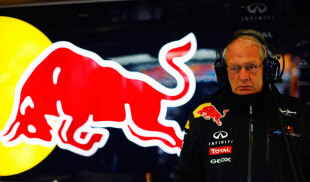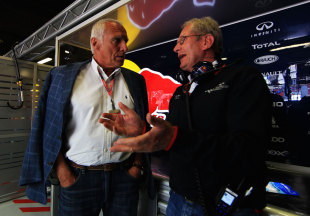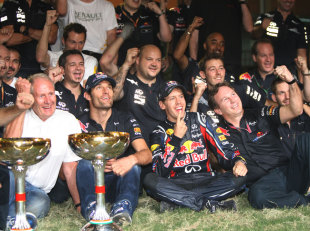- Helmut Marko interview
The Doctor is in session
It was a team effort that won Red Bull Racing and Sebastian Vettel their third consecutive constructors' and drivers' Formula One titles. Advising Vettel, as he has done over a decade, was Dr Helmut Marko. Here he reveals what makes Seb so special

Every story of great triumph has many components, and the success of Red Bull Racing is no exception. A vital and lesser-known line of force in the world champion team is that of Sebastian and The Doctor. Red Bull Racing Motorsport Director Dr Helmut Marko, 69, a school friend of 1970 Formula One world champ Jochen Rindt, came through the ranks in the all-guns-blazing era of F1, to drive for the BRM team. Losing the sight in his left eye, during a Grand Prix in 1972, put paid to Marko's Formula One promising driving career. That led him to work behind the scenes in the sport he knows and loves. Among his diverse talents (he also heads Red Bull Racing's young driver programme, through which he met Sebastian Vettel about 10 years ago) is an ability to assess racing holistically, laying bare all possible connections to improve tactics and strategy. What a great thing to talk about.
Why are you known as The Doctor?
During my racing career, I completed a doctorate in law. That was somewhat unusual, and I think the media liked saying there was a Doctor Marko on the grid. There were not that many doctors among the Le Mans and Formula One drivers. The name stuck, as a sort of label or first-name substitute. Everyone around here knows 'The Doctor', and they are not referring to medical care.
You have the reputation for understanding art and creativity, as well as the deeper secrets of motor racing, but you are regarded as very cool and aloof. Does that bother you?
You'll never make it in Formula One if you are only addicted to beauty.
Few would argue with the fact that you are a mentor in the racing life of Sebastian Vettel, for about 10 years now. You met when he was a boy with braces. How did he get the warmth and security that a young person needs in his development?
He was certainly well looked after by his parents. Young people with a penchant for love and security stay as long as they can in what you would hope is their protected zone. Others are inclined to strike out early and make their own way. But you don't need all that much TLC. It is enough to recognise their strengths. Creating an artificial atmosphere of softness and cosiness just doesn't fit in the world of Formula One.

When was the first time Vettel talked to you on a more informal basis?
No idea, really. It just happens over time without any great fuss.
How did your relationship develop into what is obviously a stable partnership?
First and foremost, we have a business partnership at a very clear, open and honest level. If he has problems, he comes directly to me - and vice versa if I have concerns. This works in a very professional manner. And, of course, you get a lot closer personally, no question.
Do you enjoy having a good chat?
Sure, but I don't broadcast that fact. It is characteristically Sebastian to hold 'Vettel the race driver' up to the public, and he wants to keep his personal life private. Quite rightly so, too. But it also has to do with the fact that he is so incredibly focused on his job, so he needs the rest and the time off. He has to withdraw into himself so that he can then call upon the thing that no other driver has, in qualifying or during a race. I'm very well aware of the way Sebastian prepares, so that gives him a great deal of personal freedom to do what it takes to achieve the best performance.
Towards the end of the season, the PR circus must have tested the limits of his patience.
You have to give him credit for the way he handles that. He could earn a lot more money if he would make more PR appearances. He is very reticent to do that. Outside his normal obligations within our team programme, he tries to only do those things that are fun.
And, regarding the 'boss', what role does Dietrich Mateschitz play in the team during the season?
If I tell him that it would be helpful if he showed up occasionally, then he does. A visit to the factory, or a racetrack, can work wonders for motivation. He is the greatest when it comes to motivation, he knows exactly what to do. He came to two races in 2012: Barcelona and Monza. Afterwards, he thought it would be better if he didn't come any more, because those were precisely the two races that yielded the worst results. I wouldn't go so far as to say he is superstitious; let's just say he is more of a spiritual man. I know that Didi gets very excited and jittery when he watches a race on television, and he also knows very well the difference between bad luck and an error - how a performance looks over three races, and suchlike. If things are not going so well for us, he inspires us. Instead of venting, he says, "Don't worry!" not, "You must…" He'd rather say something uplifting and encouraging.
As opposed to some other teams…
…which is none of our business.
Without rehashing the entire 2012 season, can we touch on a few aspects: the overall thoughts and reactions of the main characters, for example?
The year was characterised by the fact that we couldn't always make full use of the speed we had available. The beginning was rough, then came the high of Bahrain [race four of 20], and just when we thought, 'We're back', came Valencia [race eight], with that stupid alternator damage when we were clearly leading. Then Vettel's next alternator problem, in Monza [race 13]. We were about 40 points adrift then, but there was no finger pointing; in fact it pulled the whole team closer together, and everyone said, "We can do it!" No one more than Vettel: "We can do it!"
How irritated was the team's chief technical officer, Adrian Newey, during this dry spell?
Very irritated, and so he increased his work rate - which was already significant. First, he concentrated on understanding the relationship between the car and the tyres, which was a very, very finicky job this year. Secondly, there was his response to the supposed illegality the front wing. Third, he had to deal with the prohibition of the "exhaust blowings". This was perhaps the hardest setback for us, because we were absolutely brilliant when it came to using the exhaust. (Our old method has actually been reinstated, albeit in a modified form.) Lastly, we can say that, at that stage of the season, the ideal Vettel set-up had yet to be found. It is quite different from that of the Webber cars. Only with that set-up can you see the incredible, 110 per cent Vettel in qualifying.
How was your own state of mind during those weeks?
The tension was there, but problems make me even more focused than usual. The harder it gets, the calmer I see things, but my sleep suffers. I told my people, "Boys, there is no need for Vettel if we can't give him the car he needs in order for his skills to shine." Everyone made such an incredible effort, but for a while even we didn't quite understand what was going on.
Did the team principal, Christian Horner, lose his nerve?
Horner is generally the counterbalance, but I think his nervous energy was stretched to the limits at the last race. You could have cut the atmosphere with a knife before the last race - around the team, not Vettel himself.
At what moment did the team feel that they had turned a corner in terms of performance?
In Singapore [race 14 of 20], no question. Adrian Newey and his team found the all-encompassing solution in the harmony between the tyres, the front wing, the exhaust. This lent the drivers confidence, and was most noticeable in qualifying. Vettel was already ahead by 13 points when the Abu Dhabi nerve-killer came [race 18]: too little fuel in his tank after the qualifying, shoved to the back, hammer through, mistake under safety car, change wing, thundered back from last place again. Under these circumstances, third place was, of course, fantastic, but it wasn't enough to give us any relief. So everything ratcheted up for the last race in Brazil.
It was in Brazil that arguably the most exciting moment of the season took place.
Not for me. Vettel is sent into a spin by Senna in the first lap, which may have given the fans the ultimate thrill, but I became very quiet. I see that the engine is running, the damage is quickly assessed, then I see he's in 19th place, with most of the race to go, he's two seconds faster than the guy in eighth, which is where he has to be - and that's what preoccupies me. Thanks to a great team effort, we also managed the additional pitstop and so on.
How did you gauge Vettel's state of mind during the ups and downs of the season?
Sebastian's driving was virtually flawless. But he is a phenomenon: it is always like that. After the summer break, his performance curve shoots up. That's what happened in previous years, too. I don't know how he does it, but to keep doing it cannot be a coincidence. That brings us back to his method of preparation, the way he shuts himself off from the rest of the world, so that he can still call on reserves that other drivers might not have: Fernando Alonso, for example, who is busy with politics and funny comments. Vettel ignores it all, he doesn't read the newspapers, or the internet. And that's the point, you see, we concentrate on our job: to make the fastest car and the best team possible.

How does Mark Webber cope with the changing situations?
It seems to me that Webber has on average two races per year where he is unbeatable, but he can't maintain this form throughout the year. And as soon as his prospects start to look good in the world championship, he has a little trouble with the pressure that this creates. In comparison with Seb's rising form, it seems to me that Mark's form somehow flattens out. Then, if some technical mishap occurs, like with the alternator for example, he falls relatively easily into a downward spiral. No driver remains unaffected by this, because the tension is palpable. In 2010, it was particularly extreme. Webber headed into the final race with better chances than Vettel, and he probably carried the disappointment of his defeat into the 2011 season, which is so easy to understand. Something that I think is also very important is that for much of his career, Mark was never in a top team, but he was always regarded as a high flyer if he only could get into the right team. Then Red Bull puts him in a car - a possible winner - and suddenly along comes this young kid and he snatches the booty from under Mark's nose. Psychologically it's not easy, of course; this would gnaw away at anyone's confidence. It's more than understandable.
Is it better to have arch rivals or good buddies on the same team?
The important thing is that both are somewhere close in speed so that they push each other, and that the technical crews understand each car's limits. Almost all drivers have track preferences: better on one, less so on another. The better the driver, the smaller the variation. If you have two equally strong drivers, then you know where you stand with the car. For harmony within the team it is of course easier if the two get along. So in the meantime, we have found a modus vivendi. Sebastian and Mark work constructively together in tuning the cars: all information is freely available. They are not likely to go to dinner together, but that is how it is in most teams, and it's totally OK. Two alpha males can never really understand each other.
Where do you stand on the argument that there is a world's best driver and his name is not Vettel. Vettel himself remains admirably cool on the subject.
There is a lot of nonsense being said. "Vettel can't overtake." Ridiculous; just look at Abu Dhabi and Brazil. "He is only able to win because he's sitting in a Newey car." We have two Newey cars, so why aren't we clinching one-two at every race? Then the comment of the great Jackie Stewart that Vettel must go to another team to prove himself. This is said by someone who scored all his greatest successes in just one team, Tyrrell. I can't take it seriously. We at Red Bull Racing are not just a bunch of civil servants. As long as we provide Sebastian with a car and an environment in which he can become world champion, he will probably stay with us. If both do not fit, then we have to come up with something fresh. But we have a very good junior programme, and maybe some day someone else will become champion in our car.
The old gentleman, Enzo Ferrari, railed against the British 'garagisti' as virtually worthless Formula One opponents. How do you think he would have taken to a drink manufacturer as the superior force today?
I believe that there is no way old Enzo would have liked such defeat, but he would acknowledge the performance of the opposition - and then would whip his boys accordingly so they'd do everything to beat us. But not with such actions as we have recently experienced. Alonso is constantly involved in politics. I believe we saw the stress he was under towards the end of the season. Saying things like, "I'm competing against Hamilton, not Vettel," and "I'm up against Newey," these psychological skirmishes. We said, "Just ignore him."
Visit www.redbulletin.com to read the full feature and to download the Red Bulletin iPad app for free, for more sports, culture and lifestyle content.

